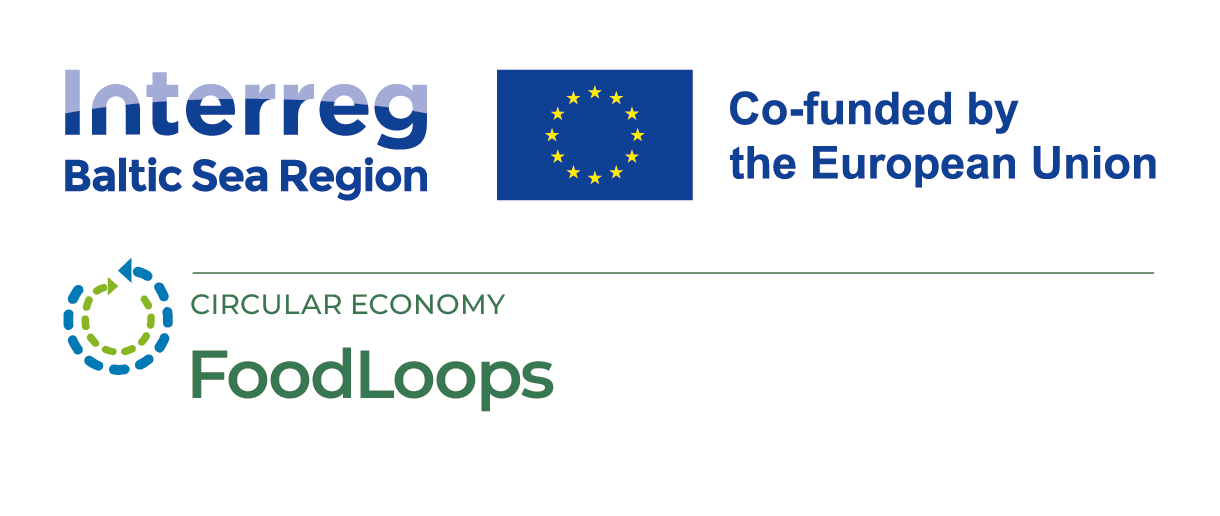
FOODLOOPS BUILDS COMMON VISION OF PROJECT DEVELOPMENT PRACTICES DURING THE MEETING IN KUOPIO 12—13 JUNE 2024
04 July 2024
FoodLoops project team in Finland, the Savonia UAS Bio and circular economy staff welcomed partners from the Centre on Sustainable Consumption and Production (CSCP) in Germany, Municipality of Gdansk in Poland and Lithuanian Consumer Institute to summery Kuopio on 12–13 June 2024. The aim of the visit was to showcase how the local waste management system works and give an insight to the Finnish vocational training. Networking activities were conducted in diverse settings and discussions on the project’s achievements and next steps emphasized workshop planning and organization from thematic and collaborative perspectives.
The first visit was organized to Jätekukko Ltd., the local waste management company. Jätekukko, owned by fifteen municipalities, is a service company that offers comprehensive waste management services in the Kuopio area and its surroundings. Pekka Hyvärinen, the Business Manager of Kiertokukko, the subsidiary of the Jätekukko, presented us the waste collection and transportation system. In their business model, sorting is encouraged through pricing.
Transportation is handled by contractors and garbage trucks are run on biogas as fuel. Jätekukko takes care of the sorting stations, waste bin service and eco points where cardboard, plastic and glass packaging, metal and paper from households are collected free of charge. The company’s services also include waste reception, invoicing and distribution of information and advisory services offered in the region. Nowadays waste center is more like a “material centre” promoting waste´s journey to other facilities.
Jätekukko provides waste bins free of charge to all households and communal customers. In autumn 2024 the obligation to sort waste will be tightened so that sorting biowaste will become mandatory in the largest urban areas. Jätekukko offers BIOKIMPPA as a solution in obligation to sort biowaste. In the detached housing areas, it is possible to organize a joint BIOKIMPPA of several households, which can reduce the household’s annual costs from tens of euros to even a couple of hundred euros. For example, implementing BIOKIMPPA for five detached houses in Kuopio, when the biowaste container (140 l) is emptied every 2 weeks costs 25,48 € annually per household, whereas if every household had their own biowaste container the annual fees would be 127,40 € per household.
We had lunch in the modern Saana restaurant at outdoor setting by the lake to enjoy some local specialties. Saana facilities also include sauna & spa, so this company has taken advantage of the Finnish nature of customer experience. In North Savo, lake area transportation is restricted to some extent, however at the same time offers unrecognized possibilities to the development of the local food system.
In the afternoon the project group shared their recent work on food waste reduction in schools and building new collaboration partnerships through workshop methods. We also planned joint and country-based upcoming activities and learnt about nutrition and gastronomy in different cultural, regional and local contexts. All project partners shared their plans for the upcoming activities and workshops. Topics included integrating student feedback and enhancing demand assessment in school meal planning, raising awareness on food waste valorization and implementation methods and assessing impact of school-based composting initiatives. Also issues about introducing IT system for the planning and management of meal preparation, working with staff responsible for meal preparation to change the caloric content of prepared meals, changing the way meals are served for the students to decide the number of products put on the plate and making nutritional standards more realistic were brought up. Regarding system-wise development, identifying specific regulatory barriers, implementation of joint procurement for the regions’ schools and shared menus for schools were discussed. Concrete workshop ideas are for example Live cooking with leftovers, Elongation of shelf life of food, Orientation to local food production, Vegetarian food and Pupils, parents and nutritionist cooking together.
Project collaboration with other networks will be implemented for instance through Dynamic Food Procurement Days as a joint e-workshop in autumn 2024. Project discussion was held about farmers´ and farmers associations´ engagement, needs and possible role in the project. For example, through collaboration with home economics teachers, food origin, preparation and logistics chain and costs can be made visible to students. Joint activities include organizing a challenge competition during the Waste Week in autumn 2024 on new ways to utilize food waste and vegetables and organizing tastings in schools.
As the project will develop FoodLoops Manual, outline and ideas were shared. Project coordinator provided a throughout introduction to the Interreg BSR reporting system BAMOS+ with discussion of future actions and aims of the FoodLoops project.
The project group gathered in the evening to see the beautiful, green and blue landscape of the City of Kuopio from bird’s eye view, as we went up to the Puijo Tower. Dinner was enjoyed at Restaurant Luoto and some went to get to know the Cathedral at night. The second day was dedicated to the visit to Savo Vocational College (Toivala district) to see the student facilities and how vocational school teaching is organized. Eelis Rissanen, lecturer at the environmental manager training, provided us a versatile, informative and illustrative presentation of the institution’s various study fields and walked around the College’s training departments. In addition, our interest was focused on catering training.
We watched a video about catering students’ work on sustainable development, preventing food waste and utilizing biowaste. Before the flight we had a common lunch in Lentokapteeni. All in all: a lively face-to-face gathering proved to be like a cherry on top of a cake in the digital age when almost all communication takes place through Teams and othere-tools.





